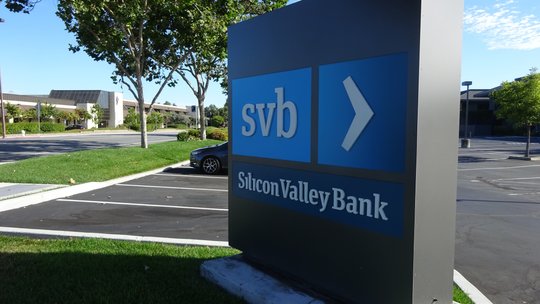
Even before venture bank Silicon Valley Bank (Nasdaq: SIVB) was shut down by regulators Friday, Triangle entrepreneurs were scrambling to close their accounts.
But not everyone made the cut before the sudden shutdown. Venture capitalists – including those in the Triangle – have been advising entrepreneurs to pull money out of SVB in case just such an event occurred.
But for some, reducing their exposure just was not an option.
“One of our companies had covenants saying that they can’t move their money out or they are in default on their loan,” said David Gardner, CEO of Cofounders Capital, which primarily invests in Triangle area tech companies.
Rumors of sale talks and a possible collapse sent the California bank's stock down nearly 70 percent early Friday. To protect depositors, regulators took over SVB, which has $200 billion in assets.
Firms with accounts less than the $250,000 insured by the Federal Deposit Insurance Corp. will have full access to their insured deposits no later than Monday morning, according to the FDIC. Excess fund holders will receive an advance dividend within the next week, and then they'll get what's called a "receivership certificate" for their remaining funds. They are being asked to contact the FDIC.
SVB Financial, the parent company of SVB, was reportedly in talks to sell itself after its attempts to raise capital failed. But deposit outflows were outpacing the sale process – complicating deal talks and creating panic in C-suites of startups.
The bank had initially sparked fears of a potential bank run with an announcement Wednesday that it had lost $1.8 billion following deposit outflow. The plan was to raise more than $2.2 billion in stock – but apparently it didn’t happen.

What Triangle VCs are saying
Gardner advised portfolio companies to limit their exposure to SVB. In a letter to CEOs sent Friday around 10 a.m., Gardner said the “conservative advice” was to leave just the FDIC insured limit in SVB.
“The less conservative guidance would be to move at least half of your deposits to another bank in case access to your accounts at SVB are restricted for a while,” Gardner wrote. “The general consensus is that the (government) will bailout SVB or another bank will buy it and all funds will be secure and accessible in time. If you have venture debt with SVB we strongly suggest modeling contingencies should your note be called. We know of at least one company that is having its note called on a covenant technicality.”
At Tweener Fund, founder Scot Wingo said portfolio firms were advised to move money to a “big bank” like JPMorgan (NYSE: JPM) or Bank of America (NYSE: BAC).
“Startup banks have a role, but in these situations, bigger is better,” Wingo told the Triangle Business Journal.
But for startups with loans tied to SVB, it gets complicated, said Mitch Mumma of Intersouth Partners in Durham.
“Each company who borrows money has to put their cash into SVB," Mumma said. "They can’t take it out if they wanted to."
How the Triangle's public companies are impacted
Securities disclosures show multiple public companies in the Triangle have teamed with SVB in recent years, including Durham’s Humacyte (Nasdaq: HUMA), which, according to a spokeswoman, considers its exposure, "if any, to be immaterial," and Raleigh’s Phreesia (NYSE: PHR).
Morrisville-based Liquidia’s (Nasdaq: LQDA) loan with SVB was paid off as part of its recent financing transaction with Healthcare Royalty Partners, the company confirms.
Durham-based Chimerix (Nasdaq: CMRX) put out a securities disclosure to investors Friday assuring them that its exposure to any SVB liquidity concern is “immaterial, given that cash held at SVB is at or near the FDIC-insured limit of $250,0000.”
The region also has another exposure – and that's SVB itself, which has had an office in the Triangle since 2009.
The Triangle office of SVB faced another big obstacle recently, when it was swindled by Elliot Smerling, a former private equity CEO now serving time in federal prison. Recently, SVB filed a lawsuit in Raleigh against insurance companies to try to recoup millions in losses from that situation.